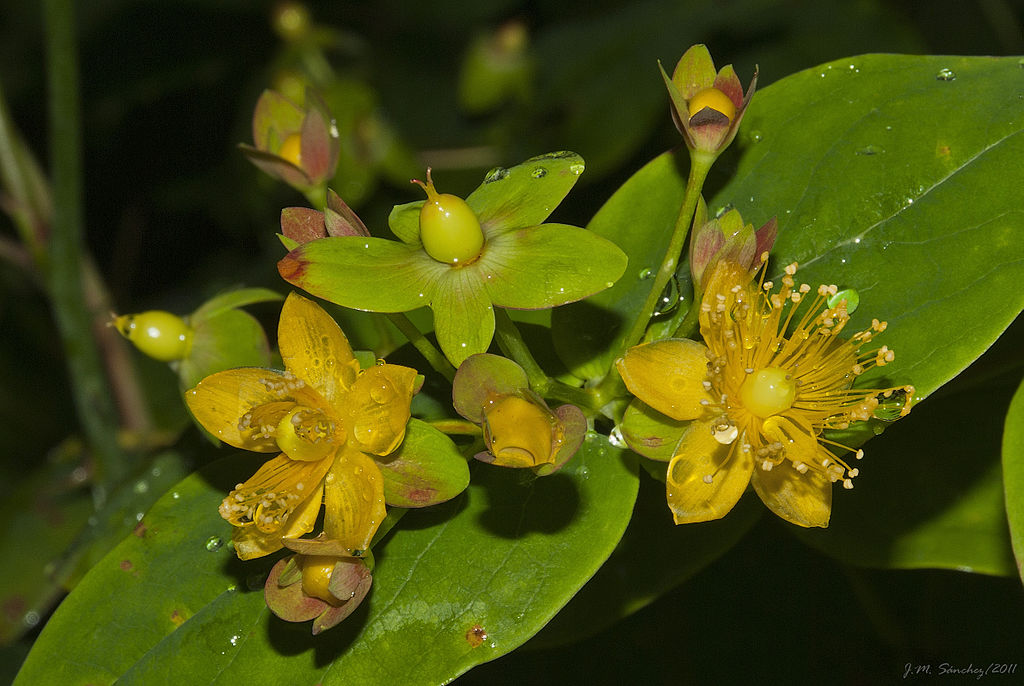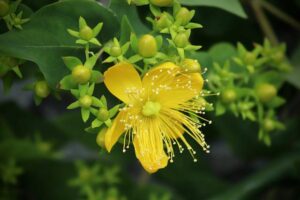Today St John’s Wort is used primarily for treatment of depression.
The use of St. John’s Wort for depression is due to the belief that it contains constituents that may help the brain produce more serotonin, which produces feelings of well-being in the body.

Juan Manuel Sánchez from Galdakao, Basque country (Spain), CC BY 2.0, via Wikimedia Commons
Introduction to St. John’s Wort
St John’s Wort is a highly valued herb that has been used in healing for more than two thousand years.
It contains both immune enhancing and anti-viral components and is being studied by AIDS researchers. St John’s Wort has significant concentrations of immune-modulating flavonoids, and also contains hypericin, a substance that is both antiviral and antidepressive.
The plant is named after St. John, the Baptist, and produces yellow petals in groups of five that resemble a halo. Red sap runs from the plant and is said to be a symbol of the blood of St. John.
Part of its scientific name, Hypericum, means “greatest health” in Greek.
For many centuries, St. John’s Wort has been used as a sedative. Not only does St. John’s Wort help depression, it is also believed to be valuable in treating:
- anxiety
- stress
- tension
- sleep disorders and insomnia
In recent years, it has gained significant attention for its potential effects on mood disorders, particularly depression.
The use of St. John’s Wort has evolved with scientific research, making it one of the most extensively studied herbs.
In addition, external use of this extraordinarily versatile herb is used in the healing:
- bruises
- minor burns (such as sunburn)
- psoriasis
- varicose veins
- wounds
Active Components and How They Work
The primary active components of St. John’s Wort are hypericin and hyperforin. These compounds are believed to contribute to the herb’s medicinal properties.
Hypericin was initially thought to be the main antidepressant compound, but recent research suggests that hyperforin plays a more significant role.
These compounds are thought to work by influencing neurotransmitters in the brain, such as serotonin, dopamine, and norepinephrine, which are involved in regulating mood.
St. John’s Wort for Depression
Symptoms of Depression
Depression is a common but serious mood disorder. It affects how you feel, think, and handle daily activities. Symptoms can include:
- Persistent sadness or low mood
- Loss of interest in activities once enjoyed
- Changes in appetite or weight
- Sleep disturbances
- Loss of energy or increased fatigue
- Feelings of worthlessness or excessive guilt
- Difficulty thinking, concentrating, or making decisions
- Thoughts of death or suicide
Efficacy in Treating Depression
There have been numerous studies on St. John’s Wort and its effectiveness in treating depression.
A meta-analysis of studies published in the “Systematic Reviews” journal in 2016 concluded that St. John’s Wort is more effective than a placebo for treating mild to moderate depression and is equally effective as standard antidepressants while having fewer side effects.
Another study published in the “British Journal of Psychiatry” supports its use as an alternative to traditional antidepressants for mild to moderate depression, particularly for those who prefer herbal treatments or who experience side effects from conventional drugs.
Over 30 clinical trials have studied its safety and efficacy for clinical depression. Most determined that it is superior to placebo and has a safety profile superior to pharmaceutical antidepressants.
Additionally, this herb contains both immune enhancing and anti-viral components and is being studied by AIDS researchers.
St John’s Wort has significant concentrations of immune-modulating flavonoids, and also contains hypericin, a substance that is both antiviral and antidepressive.
Safety and Side Effects
While St. John’s Wort is generally considered safe, it can interact with several medications, including:
- antidepressants
- birth control pills
- blood thinners
- chemotherapy drugs
These interactions can either diminish the effectiveness of the medication or increase the risk of adverse effects.
Common side effects of St. John’s Wort include:
- dry mouth
- dizziness
- gastrointestinal symptoms
- sensitivity to sunlight
St John’s Wort Folklore
“Pinch the yellow flowers of this attractive perennial and — presto, the petals turn red.
“St John’s Wort is a common roadside weed that is tied by both name and legend to religion and witchcraft. It was said on the Isle of Wight that if you stepped on the plant at twilight, you might be carried off on a magic fairy horse and not return until daylight.”
“For centuries this plant was thought to have the power to drive out devils. With the spread of Christianity, the plant was associated with St John the Baptist. It was said to bloom first on his birthday, June 24, and to bleed red oil from its leaf glands on the day in August that he was beheaded. Moreover, the plant was believed to be most potent if harvested for medicinal purposes on St John’s Day.”
Quoted from one of my favorite books on herbs: Rodale’s Illustrated Encyclopedia of Herbs
The Plant
 St. John’s Wort (Hypericum perforatum) is a flowering plant native to Europe and Asia, but now found worldwide.
St. John’s Wort (Hypericum perforatum) is a flowering plant native to Europe and Asia, but now found worldwide.
It is an attractive, hardy perennial that smells like turpentine or balsam. It has the curious property of appearing to bleed when crushed.
It is considered a noxious, rampant weed in California and the plant itself cannot be cultivated here. However, despite the fact that it spreads by runners, it is seldom invasive and can be controlled by pulling.
Use of St. John’s Wort for Depression:
St. John’s Wort can be purchased in capsules, extracts and teas. In the United States, it’s not sold as a prescription, but can be purchased over-the-counter. In Europe the herb is prescribed by physicians for depression and other illnesses.
Precautions
Even though St. John’s Wort has been tested and scientifically researched it’s never safe for you to diagnose your own illness.
Here are some things you need to consider BEFORE taking an herbal remedy – or any type of medication:
- If you’re severely depressed and have suicidal tendencies, consult a health professional before taking St. John’s Wort.
- Don’t take St. John’s Wort if you’ve been diagnosed as bipolar.
- Don’t stop prescription medications – consult a health professional first.
- If you’re pregnant or lactating, don’t take anything without first consulting a health professional.
Some side effects associated with taking St. John’s Wort are mild to severe allergic reactions, sensitivity to light, tiredness and nausea. You could also experience a lessened libido, headaches, dizziness and dry mouth.
If you’re thinking of taking St. John’s Wort, seek the advice of a health professional before you begin as it may react dangerously with some medications and ingredients in food.
Conclusion and Recommendations
St. John’s Wort presents a viable option for individuals with mild to moderate depression, especially for those seeking herbal alternatives.
However, it’s crucial to consult with a healthcare professional before starting any new treatment, especially for individuals already taking other medications.
Continuous research and clinical trials are essential to fully understand the herb’s efficacy and safety.
.
